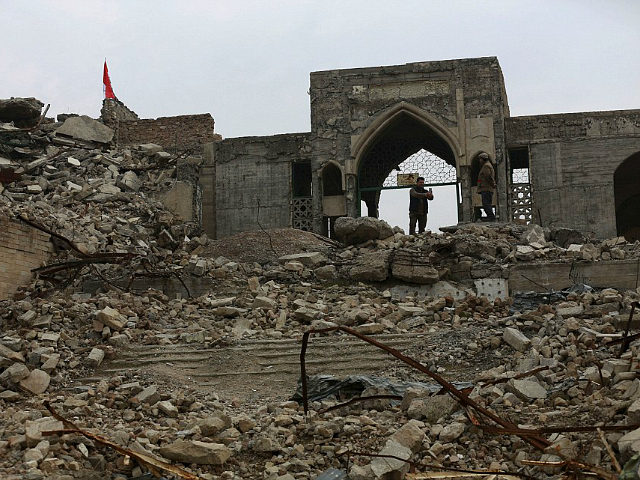Archaeologists have reportedly found the ruins of a palace dating back to 600 BC deep under the ruins of the tomb of the Prophet Jonah in northern Iraq. The Islamic State had destroyed the tomb and dug tunnels underneath, revealing the as-yet-undiscovered ruins.
Archaeologists tell the UK Telegraph that the ISIS tunnels held an inscription with cuneiform language referring to King Esarhaddon, which they believe was created around 672 BC, as well as various statues of icons and gods of the time. The remains appear to be of a palace believed to have been destroyed in 612 BC, built for king Sennacherib but renovated by Esarhaddon.
Islamic State jihadists apparently built rudimentary tunnels under the ruins of the Tomb of Jonah, looking for more ancient items to sell. The tomb was located at the site of the ancient city of Nineveh, near the city of Mosul. While the Islamic State has abandoned this site, the group still controls half of the city of Mosul.
“The objects don’t match descriptions of what we thought was down there, so Isil’s destruction has actually led us to a fantastic find,” Professor Eleanor Robson, chair of the British Institute for the Study of Iraq, told the Telegraph. “It is an opportunity to finally map the treasure-house of the world’s first great empire, from the period of its greatest success.”
Experts fear that this discovery could be fleeting, however — many of the finds may crumble under the weight of the tunnels, which appeared hastily constructed and could collapse at any time.
Liberating forces first discovered the tunnels under the ravaged Tomb of Jonah this year, and experts believe ISIS first used explosives to destroy the site completely in 2014 when they first conquered the region. The jihadists have committed similar acts throughout Iraq and Syria, notably in the Mosul, which some experts have described as “cultural genocide.”
The Islamic State also generates millions of dollars through the illicit sales of priceless ancient artifacts looted from areas it has conquered throughout Iraq and Syria. The jihadists destroy pagan, Christian, and other non-Islamic artifacts when they cannot profit off of them, claiming that the Quran orders them to destroy all idols.
A coalition of Iraqi government forces and Shiite militias have liberated the eastern half of the city of Mosul from the Islamic State, finding in the home of one ISIS leader a treasure trove of priceless ancient artifacts marked for sale this year. Most of these appeared to have been stolen from Nimrud, an ancient Assyrian site almost completely leveled by ISIS terrorists. Most of the items found in the ISIS leader’s home appeared to be pottery and other small items that could fetch a total of millions on the black market.
A Russian study presented to the UN estimated that the Islamic State made a $200 million a year profit from selling these artifacts. Among other ISIS revenue sources are crude oil from conquered territories, the jizya (infidel’s tax) imposed in conquered areas, and loot stolen from the homes of those they kill.
Despite these sources of revenue, the London-based International Center for the Study of Radicalization (ICSR) and accounting group Ernst & Young released a study last week suggesting that the Islamic State may soon run out of money and that its revenue generation capacity had fallen by 50 percent in the past two years.
The Islamic State appears to be responding to the drop in profits by expanding internationally. In Afghanistan, for example, experts estimate that ISIS is now generating up to $50 billion in opium and heroin sales. ISIS is similarly expanding in places like Libya and boasts affiliates in Nigeria, Yemen, and the Philippines, among other countries.
Archaeologists around the world are rallying UNESCO to help protect the northern Iraqi historical sites damaged by years of ISIS possession. The Times of Israel notes that experts met in Paris last week to discuss how to properly protect the liberated areas, while the Iraqi government is hoping that Interpol can help track down the stolen artifacts and the buyers who make such theft profitable for the jihadist group.
The Islamic State has similarly looted ancient sites in Syria, like the UNESCO World Heritage Site of Palmyra, making their quest to destroy non-Muslim history a cause for international alarm.

COMMENTS
Please let us know if you're having issues with commenting.